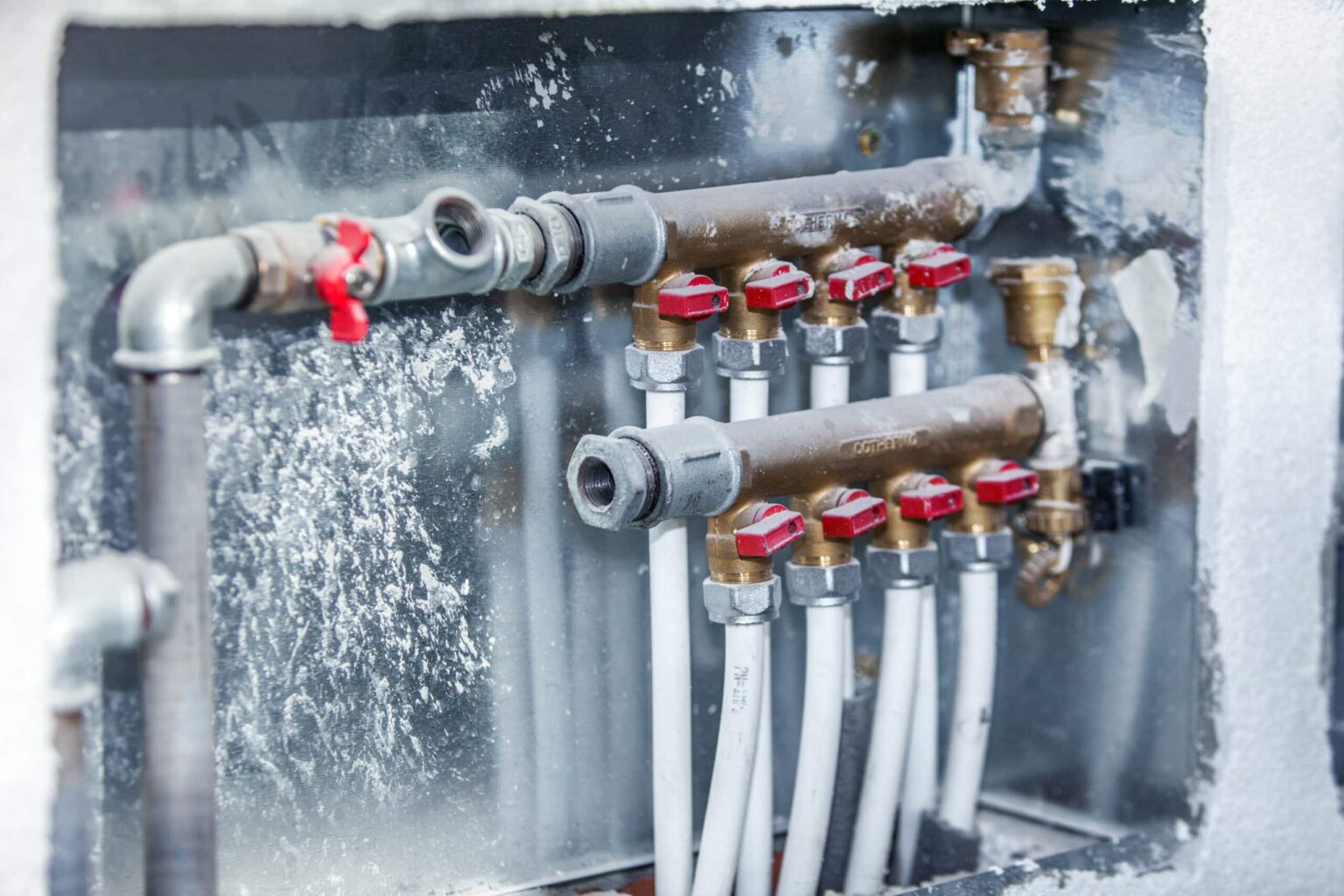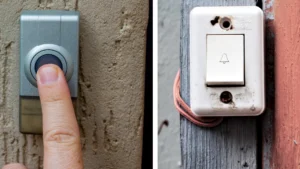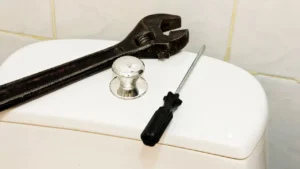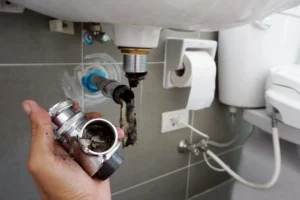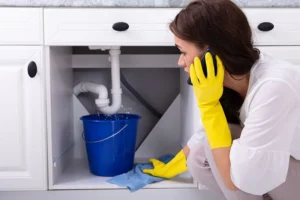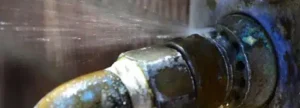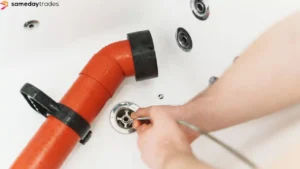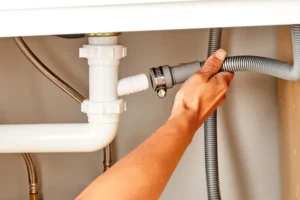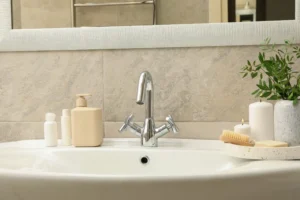Having no hot water can be a huge hassle. A tripped circuit breaker might cause this issue. We will guide you through fixing common hot water system problems. Read on to learn more.
Possible Causes for No Hot Water
Your hot water system can fail for several reasons. A gas leak or a faulty valve might prevent your heater from working properly.
Gas leak
A gas leak can prevent your hot water from working. Check the pilot light on your hot water system. If it’s out, this could indicate a gas leak, and you should call a professional for help.
Inspect your gas lines for any signs of damage or wear as well.
Always ensure the shut-off valve on your hot water heater is open. A partially closed valve may restrict gas flow and hinder heating. Regularly checking these components can save you from unexpected cold showers and other common hot water problems.
Faulty gas valve
A faulty gas valve can stop your hot water from working. If the shut-off valve on your hot water heater is partially closed, this could block the hot water flow. Make sure to check that the valve is fully open.
Inspecting the pilot light is also essential. If it’s off, you might have a gas leak. In such cases, call a professional immediately.
You could face issues with temperature control if the gas valve malfunctions. This failure may lead to lukewarm or cold water coming out of your taps instead of hot water. Hot water not heating up correctly can frustrate everyone in your home.
Stay aware of these common signs and troubleshoot them early to avoid bigger problems later on.
Pilot light is out
A pilot light that is out can stop your hot water heater from working. Check the pilot light first if you have a gas water heater. If the light has gone out, it might signal a gas leak.
Inspect the area carefully for any signs of leaking gas. If you see or smell gas, call a professional right away to fix it.
Re-lighting the pilot light may solve your problem. Follow the manufacturer’s instructions to safely re-light it. After lighting, ensure that the flame stays on and burns blue. An issue with your thermostat can also affect how hot your water gets, causing problems in the system too.
Regular checks on this part of your hot water system maintenance are crucial for efficient operation and troubleshooting hot water issues effectively.
Electric water heater malfunction
Electric water heater malfunctions can lead to hot water not working properly. A faulty thermostat directly affects the water temperature. If it’s set too low or isn’t operating correctly, you may only get lukewarm water.
Check the shut-off valve on your hot water heater, as a partially closed valve can cause issues with flow.
Another common issue arises from electrical problems. A tripped circuit breaker often stops power from reaching the heater. Regularly inspecting these components helps keep your system in good shape.
For serious issues like defective heating elements, consult a professional for repairs to ensure your hot water system works efficiently.
Thermostat malfunction
A malfunctioning thermostat can lead to hot water issues. If the thermostat isn’t set correctly, it may not heat the water enough. This can cause cold water to flow from your taps instead of hot water.
Faulty thermostats also contribute to inconsistent temperatures. Regularly check its settings and functionality.
Hot water systems rely heavily on their thermostats for proper operation. An improper setting could allow too little or too much heating energy, affecting daily use. In some cases, you might need a professional’s help for repairs if your thermostat is broken or outdated.
Always ensure your hot water system remains in good condition by monitoring the thermostat regularly.
Faulty heating element
A faulty heating element can cause your hot water system to stop working properly. This issue often leads to lukewarm or cold water, which is frustrating. If you notice that the hot water runs out quickly, this could signal a defective lower heating element.
Replacing it usually requires professional help.
Regular maintenance checks on your hot water system are essential to prevent such faults. Ensure that your thermostat is set correctly as well; an improperly set thermostat can directly affect the temperature of the water being heated.
Consulting with a technician can help address these problems effectively and restore your comfort at home.
Water heater tank size
Tank size plays a crucial role in your hot water system. If your tank is too small, you might run out of hot water quickly. This can often happen when multiple showers occur back-to-back or during peak usage times.
A larger tank can hold more hot water, ensuring everyone gets what they need.
Check the size of your heater to match your household’s needs. If it’s inadequate, consider upgrading to a bigger unit to avoid running into issues later on. Problems with heating elements may arise if the tank can’t keep up with demand, leading to discomfort and frustration.
Regular maintenance ensures that your hot water system runs smoothly and efficiently for everyday needs.
Troubleshooting Tips for Common Hot Water Issues
When your hot water system acts up, simple steps can help you identify the problems. Check for any blockages in the water flow and clear out limescale buildup. Adjusting temperature settings might also solve some issues.
Keep an eye out for leaks too, as they can indicate larger concerns. If needed, reset your power supply to restore functionality. Curious about more solutions? Read on!
Checking for water flow issues
Water flow issues can cause your hot water to malfunction. A partially closed shut-off valve on your hot water heater might restrict flow, leading to inadequate heating. Ensure that this valve is fully open for optimal performance.
Check the isolation valve as well; if it’s turned off, it could be the reason you’re not getting hot water. Inspecting these valves is a quick step before moving on to more complex problems.
Hot water not working properly often begins with simple checks like these, so don’t skip them!
Dealing with limescale buildup
Limescale buildup can cause your hot water to not function properly. It often occurs in areas with hard water. This mineral deposit affects heating elements in your system. A faulty lower heating element may lead to hot water running out quickly.
Regular maintenance helps prevent this issue.
Check your system for signs of limescale. You might notice reduced water flow or fluctuating temperatures. Dealing with this problem early on can save you from costly repairs down the line.
If the buildup gets severe, consulting a professional is wise. They have the tools and expertise needed for effective hot water system repairs.
Adjusting temperature settings
Adjusting the temperature settings on your hot water system can solve many issues. A faulty thermostat may cause the water to come out at a far too low temperature. Check the thermostat and set it to your desired heat level.
Sometimes, people forget that their shut-off valve could be partially closed. Ensure this valve is fully open for proper water flow. Regularly inspect these settings to maintain a functional hot water system and avoid any uncomfortable surprises in your shower!
Checking for leaks
Inspect your hot water system for leaks regularly. A small leak can cause significant problems over time. Start by checking the area around the shut-off valve and plumbing connections.
Look for water pooling or damp spots that could suggest a leak.
A gas leak may also affect hot water not working properly. Check the pilot light on a gas heater. If it’s off, there might be a gas issue, and you should call a professional immediately.
Also, if isolating valves are closed partly, this could stop hot water flow too. Make sure everything is fully opened to restore function in your hot water system troubleshooting efforts.
Resetting power supply
Resetting the power supply can often solve your hot water problems. Check for a tripped circuit breaker first. A simple flip back to “on” might restore your hot water system quickly.
If you’re using an electric water heater, turn off the power at the main switch before resetting it. Wait about five minutes, then turn it back on. This helps clear any minor glitches that prevent hot water from flowing correctly.
Regular checks of your hot water system ensure it operates efficiently and avoids larger issues down the line.
How to Reset Your Hot Water Heater
To reset your hot water heater, follow the simple steps specific to either gas or electric models. This process ensures that your system works properly again. Ready to learn more about fixing those hot water problems?
Steps to reset a gas water heater
Start by turning off the gas supply to your heater. Locate the shut-off valve and turn it clockwise until it stops. Wait for about 10-15 minutes. This allows any residual gas to clear out safely.
Next, find the thermostat on your gas water heater. Set it back to your desired temperature, typically around 60 degrees Celsius. Turn on the gas supply again by reversing the shut-off valve direction.
Finally, press or flip the ignition switch according to your model’s instructions to relight the pilot light if needed. If you notice a persistent problem or suspect a gas leak, call a professional immediately for assistance with hot water not working properly in your system.
Steps to reset an electric water heater
To reset an electric water heater, first, turn off the power. Locate the circuit breaker for the water heater and switch it to the “off” position. Wait for about five minutes before flipping it back to “on.” This allows any temporary issues to clear up.
Next, check your thermostat settings on the unit. Make sure they are set correctly. If your hot water still does not work, inspect for limescale buildup or other faults in the system.
Limescale can affect heating efficiency and lead to problems with hot water not functioning properly. If you encounter ongoing issues after resetting, consider calling a professional for help with troubleshooting hot water problems.
When to Call a Professional for Hot Water Problems
If your hot water system shows signs of serious trouble, don’t hesitate to call a professional. They can quickly diagnose and fix the issue. Getting expert help saves you time and stress.
Curious about how to book a service appointment? Read more!
Signs of a serious water heater issue
Signs of a serious water heater issue often show up in various ways. A gas leak may cause your pilot light to go out. If this happens, you need to call a professional right away. A malfunctioning thermostat can also impact your hot water system.
Incorrect temperature settings might lead to cold water coming out when you turn on the tap.
Hot water running out quickly is another major sign. This could mean there’s a defective lower heating element that needs replacement by an expert. Check the shut-off valve as well; if it isn’t fully open, hot water won’t flow properly.
Regular checks can help identify these faults early and keep your hot water system running smoothly. Always consult with professionals for serious issues to avoid further complications or repairs later on.
Benefits of professional services
Professional services offer quick and reliable solutions for hot water problems. Technicians have the training to diagnose issues correctly. They can identify things like a gas leak, faulty thermostats, or defective heating elements that an untrained eye might miss.
This expertise ensures safety and efficiency in your hot water system.
Fixing complex problems yourself may lead to further complications. Professionals know how to handle tricky situations safely. Consulting them means you get quality repairs and peace of mind.
Regular maintenance from experts keeps your hot water system running smoothly for longer periods.
How to book a service appointment
Booking a service appointment for your hot water issues is simple. Start by visiting the Australian Hot Water website. They offer easy access to professional services. You can fill out an online form or call their customer support team directly.
Provide details about your hot water system and the specific problems you’re facing. Be clear about whether you have gas or electric heating issues. Once you submit your request, they’ll schedule a visit at your convenience to fix any faults in your hot water system.
Conclusion
Hot water problems can be frustrating. You might find easy fixes among the common issues we discussed. Regularly check your hot water system to catch problems early. If you struggle with any of these tips, contact a professional for help.
A quick call can save you time and trouble.
FAQs
What can I do if my hot water is not working?
If your hot water system has faults, you could try some troubleshooting tips like checking the boiler settings or ensuring the unit is properly connected. If these don't work, it might be time to seek professional repair services.
Can I fix hot water problems by myself?
Yes, some common issues with hot water systems can be fixed at home using a basic troubleshooting guide. But remember, complex repairs should always be left to professionals to avoid further damage.
How often should I carry out maintenance on my hot water system?
Regular maintenance of your hot water system helps prevent faults and ensures its longevity. It's best practice to schedule maintenance checks every six months to a year.
Where can I find answers for other common questions about my hot water system?
Look online for resources that answer common questions about fixing hot water problems or maintaining your unit effectively.

